
Work had been his life since the war began. Many of the people bombed were his neighbors, people he grew up with.
Hatem Al-Atar is 25 years old and unmarried. His bravery was neither reckless nor ignorant. He knew he could die at any moment.
“All the war days From October 7 It’s been difficult so far. Every second of this war is difficult. You can lose your life and your loved ones at any time,” Hatem said.
He sat with his comrades in the civil defense office in Deir al-Bala. They chatted and checked their phones. Everyone is a survivor.
Ninety-four of their comrades were killed. More than 300 people were injured, almost half of the Gaza Civil Defense Organization.
For Hatem, death was like the explosion that knocked him down in a house near Al-Nasser Hospital.
“There were people hurt or killed around the house,” he recalled.
“I went in to check if anyone was there, alive or dead. When I finished checking, a reconnaissance missile hit the house.”
Video captured by a colleague shows him striding into the building. There is a fire burning on the left side of the screen.
Then there was a loud bang, smoke, and a man staggered out, but it wasn’t Hatem.
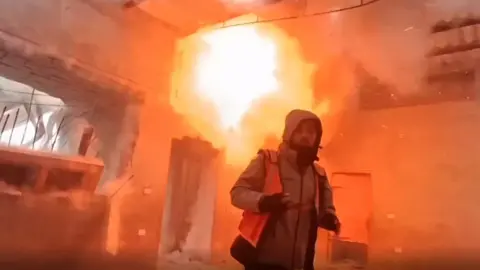
His friends went back inside and dragged him out. He was coughing and had to be supported. But he survived.
Others close to him were not so lucky.
On March 14 last year, when Ramadan began, he received a call from a brother at four in the morning.
In times of war, no one in Gaza called with good news.
“He told me that our house in Brigi was attacked and my father was killed.”
Hatem went to Al-Aqsa Martyrs Hospital in Deir al-Balah and met a family friend who took him to the morgue.
“When I went there, my father was lying on the floor next to eight other bodies. They were my sister-in-law and her seven children! I was shocked.”
Still, Hatem kept moving forward, into the sites of explosions, collapsed buildings, and ruins where the dead and occasionally the living were buried. He pulled out the body, and parts of it.
Then the moment came when the bombing and shooting stopped.
The first night without air raids. It’s time to start thinking about something that hasn’t been guaranteed for the past 15 months – the future.
His thoughts turned to education and romance.
“With this deal in hand, I should think about what to do next. I will continue my university studies once the university resumes operations. I am single, but I will consider marriage.”
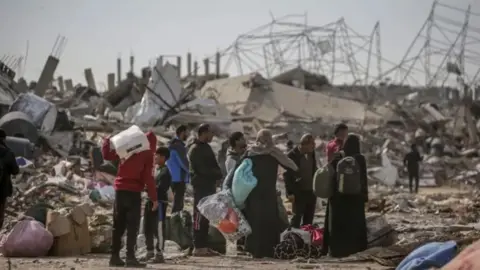 USEPA
USEPATo tell the story of how the people of Gaza are experiencing this war, my colleagues at the BBC and I rely on the tireless work of the local journalists who work for us.
Israel Ban foreign media from entering Gaza Independent reporting on the war.
BBC local reporters have been on the streets almost non-stop for nearly 24 hours to capture the atmosphere in Gaza during the ceasefire: a gunman stood on the road in Nuserat, central Gaza, firing into the air; Hamas fighters and police reappeared; A few yards down the road, another group fired into the sky. Crowds gathered at intersections and street corners; a man knelt down and kissed the ground.
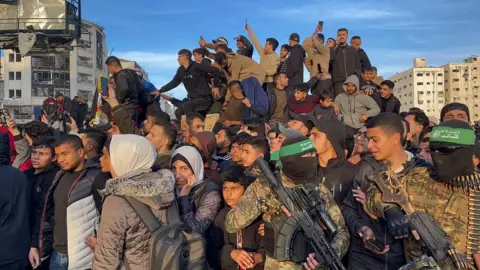
But it all happened against a backdrop of ruins. Trucks and cars trudged by, carrying people’s belongings. Some people use donkey carts to haul possessions that have survived multiple displacements.
Today, hundreds of thousands of journeys are made in Gaza. Some are actually ongoing. Others exist in the imagination. Everyone has one direction – to go home.
Professor Juma Abu Shiha arrives at the remains of his house in Nuserat.
First, he said the feeling of surviving was “indescribable.” He prayed to himself: “God is the best arranger of our affairs.”
He repeated this as he walked from one shabby room to another. His wife and several children followed.
The walls were blown up. The interior was riddled with machine gun and shrapnel marks.
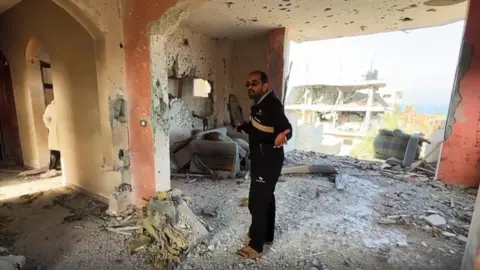
Professor Abu Shiha described how he built the house “piece by piece,” painted it, and cherished the moments he spent living here with his family.
“I couldn’t find the house, I could only see destruction, not the house,” he said. “I didn’t expect this. I wanted to go back to the house and find a place to shelter me and my children.”
He pointed to his daughter’s room and his son’s room, which had been carefully decorated but now abandoned. “The feeling is indescribable,” he said.
The rebuilding task ahead is daunting. The United Nations and aid agencies have repeatedly Accuses Israel of blocking aid flowThe United States once threatened to limit military aid to Israel unless more aid was allowed into Gaza. Israel denies restricting aid.
Rescue trucks were moving through the strip throughout the afternoon. Among them was a convoy from the Jordanian Hashemite Charity Organization, We reported last weekon a trip from Amman to Gaza.
Forklifts have transported tons of medicine and food to help Gaza’s nearly 2 million displaced people (about 90% of Gaza’s population).
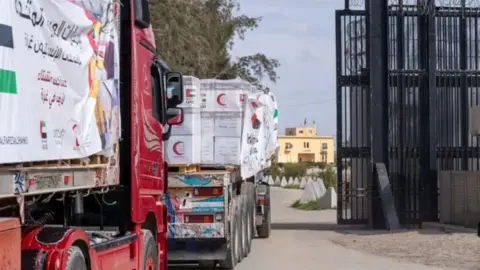 Getty Images
Getty ImagesThis assistance is real assistance. It can be weighed, counted, loaded and ultimately distributed. People can be fed and given medications. But there is another challenge, the demands of which are enormous and will have far-reaching consequences for Gaza’s future.
The war has left an unknown number of adults and children traumatized. We recorded some of their stories But we know there are tens of thousands more yet to be revealed.
Children face severe suffering. According to a survey of 504 caregivers of children, British charity War Children96% of children feel death is imminent.
The interview also found that 49% of people had a death wish. Our reporters often hear from young survivors who wish they could be reunited with their deceased mothers, fathers or siblings.
Last October, ten-year-old Amr al Hindi was the sole survivor of an Israeli attack on the residential complex where he lived in Beit Lahia. Our colleagues in the area took pictures of Amru at the hospital after the attack.
The floor around him was covered with wounded men. A woman sat there with blood streaming from her ears. Someone nearby had just died.
“Where is Sharif?” Amr asked repeatedly. A nurse told him Sharif was fine. “I’ll take you upstairs to meet him.” But his brother Sharif did not survive. Neither did his other brother Ali, his sister Axel, or his parents. The whole family was gone.
As soon as the ceasefire was announced, we went back to see what was going on in Amru Indy. He lived with his grandparents, who obviously loved him with great care and tenderness. After the explosion, three of the child’s toes were amputated, but he is still able to walk normally.
Amul sits on his grandfather’s lap and looks directly into the camera. He was motionless and composed, as if he were looking out from behind a thick protective screen. He started talking about his brother Ali and how he wanted to go to Jordan to study to become a doctor.
“I want to be like Ali. I want to fulfill his dream and go to Jordan and become a doctor,” he said. But with those last few words, his tears began to fall and he began to sob.
Amru’s grandfather kissed him on the cheek; he said “honey” and patted his chest.
At this point, we know there’s a lot of war going on here.
Some have been suspended. For survivors, others are long-term.
Additional reporting by Alice Doyard, Malaak Hasona and Adam Campbell.








